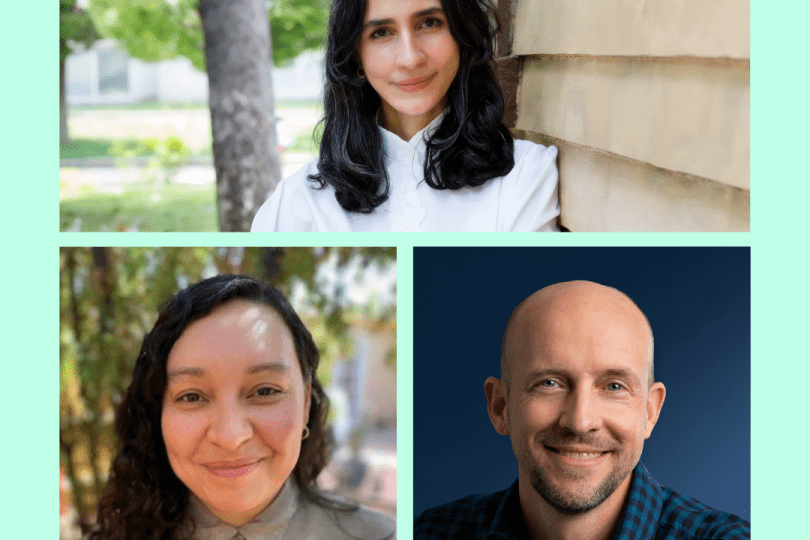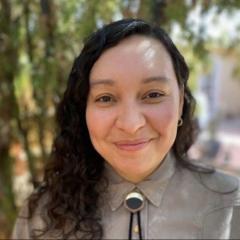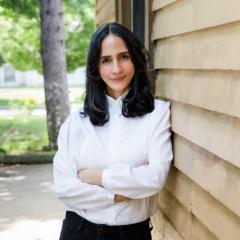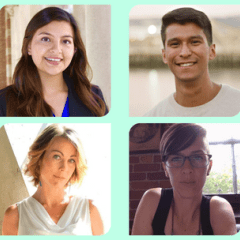Introducing New Fellows Advisory Committee Members
The Fellows Advisory Committee (FAC) uses their wisdom and experience as Switzer Fellows to advise the foundation to ensure our programs and efforts are relevant for the Switzer Network. We welcomed three new members to the committee this year: Demi Espinoza, Nathan McClintock and Bruni Pizarro. We are excited to introduce them to you, and invite you to learn more about them in their responses to the questions below!
Demi Espinoza
What motivated you to become an FAC member?
Participating as a Switzer Fellow profoundly impacted my personal development and career trajectory. As a fellow, I was introduced to a network of deeply committed and innovative professionals that significantly broadened my worldview. I chose to engage with the FAC to reciprocate the invaluable contributions the network has made to my growth. I am enthusiastic about collaborating with fellow FAC members to formulate strategies to attract a more diverse cohort of students from varied backgrounds and communities.
What inspires you about the Switzer Network?
The Switzer Network encompasses professionals from a multitude of sectors who are dedicated to addressing some of the most critical environmental issues of our time. I enjoy following the work of both current and former fellows, and I appreciate the network's robust culture of mutual support.
What unique perspectives or experiences will you contribute to the FAC?
As a first-generation Queer Latinx/e graduate, I have been greatly influenced by the advantages and resources afforded by the Switzer Network. I aspire to bring attention to the significance of fostering diversity of experiences, particularly among individuals who have experienced the impact of environmental injustice and have been excluded from the mainstream environmental/climate movement. The perspective of justice is crucial in developing and shaping comprehensive solutions to our environmental and climate challenges.
Nathan McClintock
What motivated you to become an FAC member?
I gained a lot from being a Switzer Fellow, especially at the retreats, which were excellent opportunities to meet other students, network, and learn valuable tools. Joining the FAC seemed like a way to give back. As a mid-career scholar with job security who has benefitted from tremendous race, class, ability, and gender privilege to get where I am today, I feel that it’s important to use this privilege to contribute to creating more equitable, transformative spaces and opportunities both inside institutions and in the outside world.
What inspires you about the Switzer Network?
I’ve been impressed by the way the foundation has made equity a central concern in recent years, both in supporting fellows who work on these issues, but also inside the organization and via the programming. Seeing this kind of reflexivity and action at the heart of an organization is inspiring. Every year when I read about the new cohort, I’m so inspired by the work they’re doing, and excited that Switzer is supporting this kind of work and fostering connections between all of us.
What unique perspectives or experiences will you contribute to the FAC?
I can bring my perspective as a mid-career scholar to the FAC, with experience supervising graduate students and fostering their professional development and connections. I’m active in my field (geography), so I have a good sense of the wider work that’s required of an academic outside of teaching, research, and writing. I’ve had the pleasure of working with community partners and teaching so have learned a lot from that through much trial and error! I’ve also worked internationally in both the so-called global North and South. I now work at a French-speaking institution in Quebec and engage with scholars from around the Francophone world. More than anything, I’m looking forward to exchanging with and learning from my colleagues!
Bruni Pizarro
What motivated you to become an FAC member?
As a graduate student, I often felt alone in my work on climate displacement/resettlement and in bringing cultural perspectives to the forefront. The Switzer Network saw my potential and offered a community with diverse perspectives on the environment. I found my people in the Switzer community. I look forward to supporting the organization so that more students can know that they are not alone in this work. I'm excited about co-strategizing with the FAC to scale impact for the organization as they continue to meaningfully attract the next generation of innovative and diverse environmental leaders.
What inspires you about the Switzer Network?
I'm inspired by my colleagues in the network who have gone on to do amazing things and have led the way with open hearts and minds to think creatively and with intention about the often complex dimensions of climate change and the environment.
What unique perspectives or experiences will you contribute to the FAC?
I'm a storyteller and ethnographer and often collaborate with artists to amplify voices on the margins. Growing up in NYC in the 1980s, my landlord burned garbage on the roof. My father organized tenants to remove the incinerator. He was an environmental justice and public health advocate before I can remember hearing about this subject. This cemented my understanding of how the environment is not created equal for all. I'm excited about strategies to attract and support fellows who may also have experienced unique circumstances and who, with the right support, resources and networks, can become even more outstanding environmental leaders.




